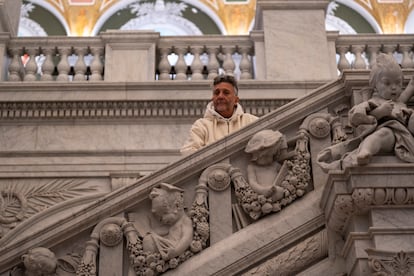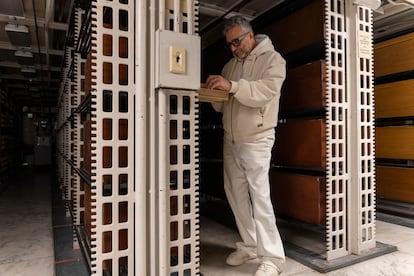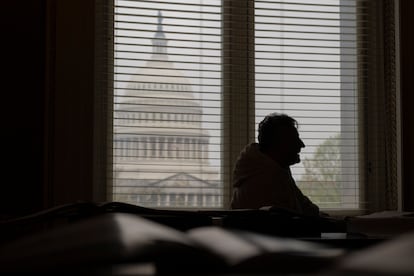It was a “memorable” afternoon for Argentinian singer-songwriter Fito Páez. He knelt before the handwritten score of a Mozart violin concerto and said, “If God exists, this is Him.” He shared his passion for writer Macedonio Fernández about whom he said, “Without him, Borges would not be the same.” And he folded his hands in a gesture of prayer when he saw treasures such as a first edition of Roberto Arlt’s El juguete Rabioso – Mad Toy, a third edition of Milton’s Paradise Lost, and a century-old map of the Argentine Republic, in which he looked for Rosario, the city where he was born 62 years ago.
But the best part came later, when Nicholas Brown-Cáceres, from the music department of the Library of Congress in Washington, D.C., opened the door to the room where the institution keeps a Steinway piano that belonged to George Gershwin, Paez’s “absolute hero.” Pouncing on the keys, he said, “I don’t believe it!” and played one of the best-known passages from Rhapsody in Blue, followed by an excerpt from El vuelo, one of the songs on Páez’s new album.
Páez had been in Washington all week to talk about his recently released album, Novela, on a couple of influential radio stations, and the library treated him to a ritual they reserve for important musicians, which involves showing them a tiny portion of their archives, containing 180 million items in all. The idea is to show the visitor treasures that will be meaningful to them, and with Páez, they had certainly done their homework. With the building closed to the public, objects awaited on a large table for Páez, whose enthusiasm was infectious: from scores by Astor Piazzolla and Leonard Bernstein to a print of Goya’s Tauromaquia and even a copy of Raíces y Recuerdos – Roots and Memories – the memoirs of Abrasha Rotenberg, his ex-father-in-law, who was also the father of his former sentimental partner, Cecilia Roth. “I have to write Cecilia to tell her about it; she won’t believe it,” Páez said later.
There is a permanent exhibition of Gershwin on the first floor that includes his piano and other memorabilia. This is the legacy of a man who died at the age of 38 yet still had time, with and without his brother Ira, to leave an indelible mark on American music with dozens of songs, including operas (Porgy and Bess), musicals (An American in Paris) and Rhapsody in Blue. “And all that from this simple desk,” said Páez, pointing to a deco-style piece of furniture that belonged to the composer of I Got Rhythm. “It’s so different from the way it is now, with so much Pro Tools, so many consoles, 400 people to write a song that has 18 words and 21 different authors…” Páez observed. “[Gershwin] was one of the greatest geniuses in the history of music. Let’s see if I can take something from this.”
After the “intimate” visit — which in fact included several members of Páez’s entourage, a guy from his record label, a PR woman from New York, a film crew from a documentary that Netflix is preparing about him and a member of his band, Carlos Vandera, another native of Rosario — the musician sat down to talk to EL PAÍS and recalled that his connection to Gershwin goes back a long way. He inherited an admiration for Gershwin from his father. As a child, his ability to learn melodies by ear allowed him to trick his teacher, Domingo Scarafía, into thinking he was reading the music; Scarafía had also taught his mother, a “great concert pianist” who, Páez says, could perhaps have reached the levels of Martha Argerich if she had not died eight months after giving birth to him. It was after Scarafía asked him to play Rhapsody in Blue that the teacher realized after a while that he couldn’t read the sheet music. “He closed the lid of the piano on me and sent me home never to return,” Páez said.
Páez also talked about his new album, a slow burn. He began writing it in 1988, at one of his lowest points in life, when the need to release another album, Ey! and the lack of support from his label forced him to put it on hold. The memory of the murder of his “two grandmothers” (his grandmother and his great-aunt, who had raised him) was still fresh in his memory, and he had yet to taste the success of El amor después del amor (1992), his best-selling album, which made him a star in Latin America and serves as the title for his Netflix bio-series.
He is not too fond of the concept, but Novela is what used to be called a rock opera. It is an ambitious work that tells the incredible story of a school of witchcraft called Prix University “in the manner of Tommy or Quadrophenia, by The Who.” It depicts a parallel universe, and two of its rebellious students, Maldivina and Turbialuz, have to orchestrate a perfect romance between Loka, daughter of the owner of Circo Beat, and Jimmy, guitarist of a rock band from Villa Constitución, a city near Rosario.

Páez kept turning that crazy story over in his head for years until last year he decided to do something about it. “My girlfriend [actress Eugenia Kolodziej] went to Madrid for six months, and I went with her,” he recalls. “I said to myself: I can’t be waiting around all day. I thought about writing songs for an album. And then I thought, why start something from scratch if I already have this idea?”
He composed 17 new songs, recorded part of it in a studio in Madrid, then finished the bulk of it off at Abbey Road Studios in London. “It was a challenge, and that’s what excited me; there was a narrative I had to respect. It wasn’t just an album of songs – it was a story. The challenge was to see if I was capable of that. I’ve written novels, short stories, I’ve directed films and, of course, I’ve written songs for records, but never something like this.”
Dealing with “the Fito of 1988” helped him to realize that that young man was on the right track. “One does not change in essence. Of course one has made a lot of mistakes, done crazy things, done damage and had horrible experiences,” he says, adding that, despite it all, he is still recognizable.

The result is “a message in a bottle” launched to “a world that is busy overriding the imagination, installing the gene of domestication and poisoning the vitamins of rebellion.” The idea is that the album will be something people sit down to listen to in one sitting in an age in which streaming has fragmented music. But it was not his intention, he stresses, to do anything controversial.
The battle cry
However, he does plan to stir things up with his next project: a book on the music of the 21st century. It is, he says, a “philosophical, but not scholarly essay” on “some problematic issues” he finds in “popular music and the understanding of Latino culture in the United States … It’s about explaining the context,” he says. And he talks, of course, about reggaeton. “It emerged in 1989, before the fall of the Berlin Wall, in Panama, a radar country, a satellite of the United States, like Puerto Rico. The migrants who come here are eager to join the gringo system and that has led to a loss of traditions,” he says. “The United States is a place of extreme power and the Latino culture, which is infinitely rich, is reduced by that. My view is that there is much more [to Latino culture], although it may not seem so. The history of a continent cannot be erased. My book was born out of the weariness of hearing the same voices and the same discourse over and over again.”
After Washington, Páez planned to travel to Boston to read part of his book at the music institute of Berklee. He was eager to present his ideas to a young audience. “All the fun stuff used to happen in youth,” he says, “but now young people are more conservative, especially pop artists; there’s a cultural anomaly there.” New York was the other stop on his tour of the US, a country with which, he says, he has “an extremely complex but beautiful relationship… I have had a thing about gringo culture: Sinatra, Miles Davis, Coltrane, Steely Dan, Prince…. Then when hip-hop came along, I stopped being interested in it. I was raised on harmony, rhythm and melody. When any of those three aspects fail, I feel that something is missing.”

Asked whether he feels like an envoy from the future, arrived from Javier Milei’s Argentina to Donald Trump’s Washington and Elon Musk’s chainsaw version of 21st-century America, the artist almost chokes on a laugh. “More than the future or the past, it seems to me that we have to talk about the smartphone as an element of domination. That’s how they win elections in Argentina,” he explains. “That’s why there are so few mobilizations, except for those of Women’s Day – women are the future when it comes to protest. The case of Milei is framed within the democratic process. So like it or not, it has a foundation that’s supported by votes. So there is nothing left to do but to endure four more years.”
This time there was no military coup, the musician continues, “but an extreme degradation of the political institutions set up to defend the people. It is a lesson for them too. All this can be turned around because the democratic system has that capacity, but it is in crisis because what conditions everything is the financial system. Political power has almost disappeared, a horrible word that is part of the Argentine culture. It has been eliminated.”
During the pandemic, Páez gave a concert via streaming from the solitude of his studio that hundreds of thousands of people saw. The experience, however, left him “shocked – if there had only just been one person there,” he explains. Now he nurses the idea that “despite Silicon Valley” some things will remain. “Look at our 18th-century cousin,” he says of Mozart and the score he marveled at earlier.
After enjoying rummaging through the 22 million paper cards in filing cabinets inside a cavernous room across the large empty reading room, Páez signed a guest book to show his “appreciation” for being allowed to spend time among the “literary and musical wonders” of the great “archive of Babel.” He bid farewell to the librarians and ventured out into the rainy Washington afternoon, followed by his staff.
Sign up for our weekly newsletter to get more English-language news coverage from EL PAÍS USA Edition


